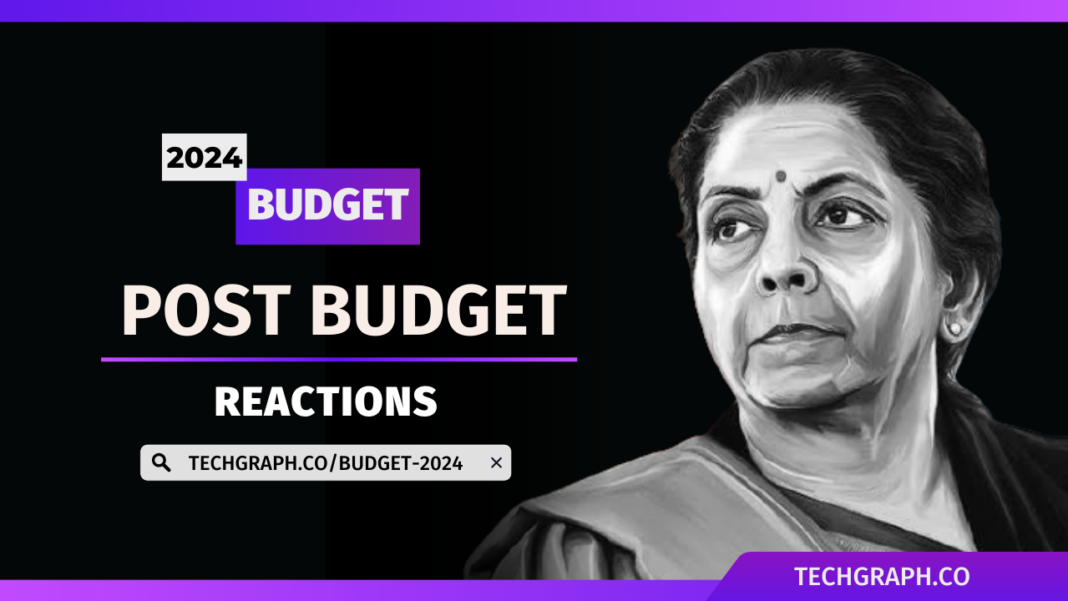In response to Finance Minister Nirmala Sitharaman’s proposed interim budget for the fiscal year 2024-25, the startup and investor community have acknowledged the government’s efforts to support and foster innovation.
While the budget aligned with expectations, several key areas have drawn attention and praise from entrepreneurs and industry experts.
Here’s What Startup founders, Angel Investors & Venture Capitalist Said:
Anil Joshi, Managing Partner, Unicorn India Ventures
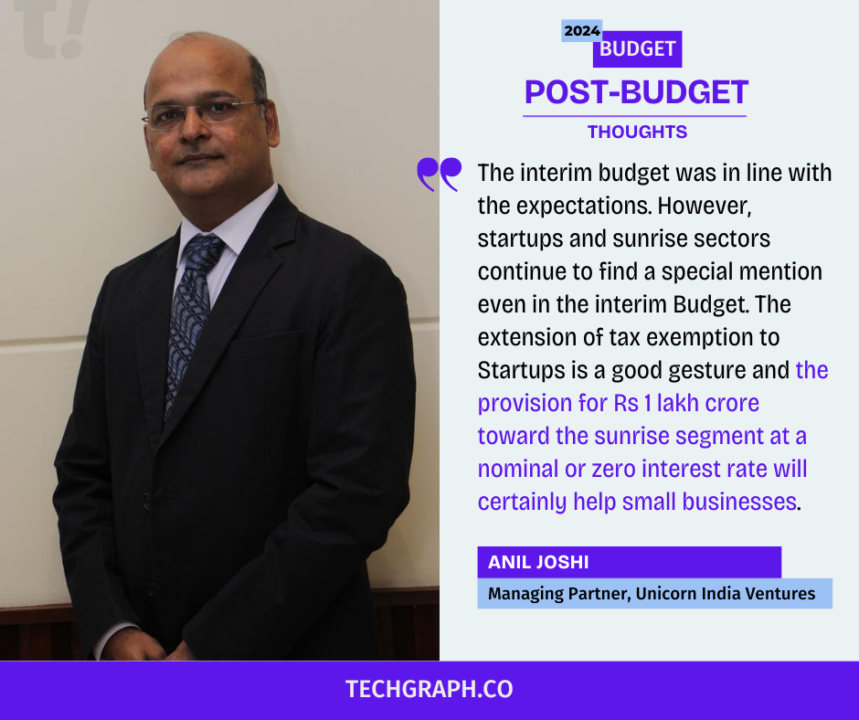
The interim budget was in line with the expectations. However, startups and sunrise sectors continue to find a special mention even in the interim Budget. The extension of tax exemption to Startups is a good gesture and the provision for Rs 1 lakh crore toward the sunrise segment at a nominal or zero interest rate will certainly help small businesses. The focus on boosting EV charging stations will drive the sale of both vehicles and charging infrastructure. No change to direct and indirect tax was also expected, however, we may see new rates in the full budget to be proposed in July 2024
Mahankali Srinivas Rao (MSR), CEO, T-Hub
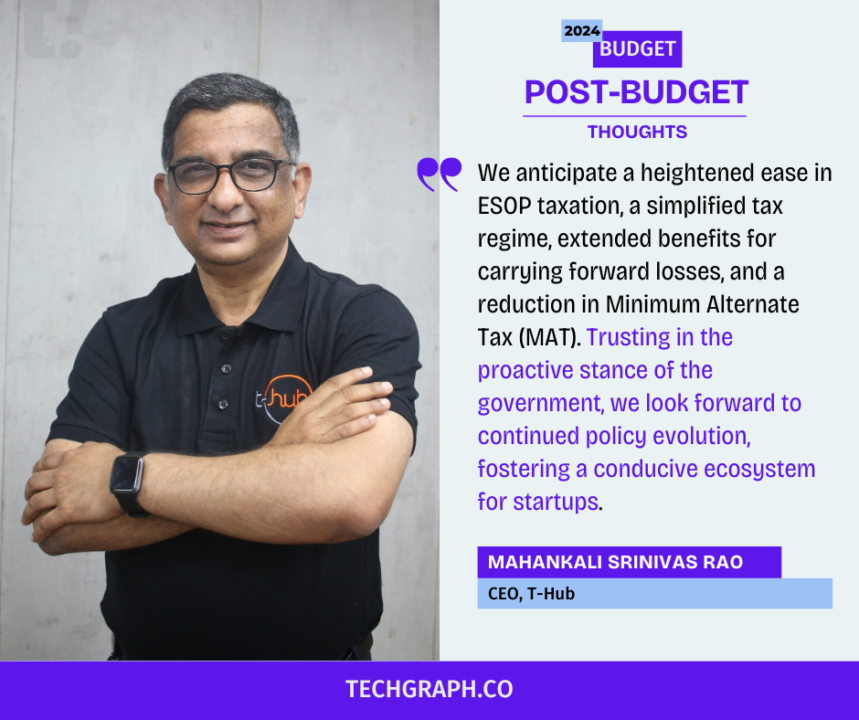
We applaud the Indian Government for its visionary Interim Budget 2024, a pivotal step towards fostering innovation and growth within the dynamic Indian startup ecosystem. The reduction in corporate tax rates is a commendable move, providing a conducive environment for existing and new companies.
The decision to retract outstanding direct tax demands is a welcome relief, aligning seamlessly with the broader vision of facilitating ease in daily living and conducting business.
Another significant milestone is the allocation of a substantial one lakh crore corpus for research and innovation signifies a transformative leap, ushering in a new era for our tech-savvy youth. Furthermore, the introduction of a scheme dedicated to deep-tech technologies in defense resonates with the overarching aspiration of achieving ‘Atmanirbharta.’
While the proposed amendments offer encouragement, the startup community eagerly awaits more definitive measures. We anticipate a heightened ease in ESOP taxation, a simplified tax regime, extended benefits for carrying forward losses, and a reduction in Minimum Alternate Tax (MAT). Trusting in the proactive stance of the government, we look forward to continued policy evolution, fostering a conducive ecosystem for startups.
Tarun Sharma, Founder and CEO, Yodda Elder Care
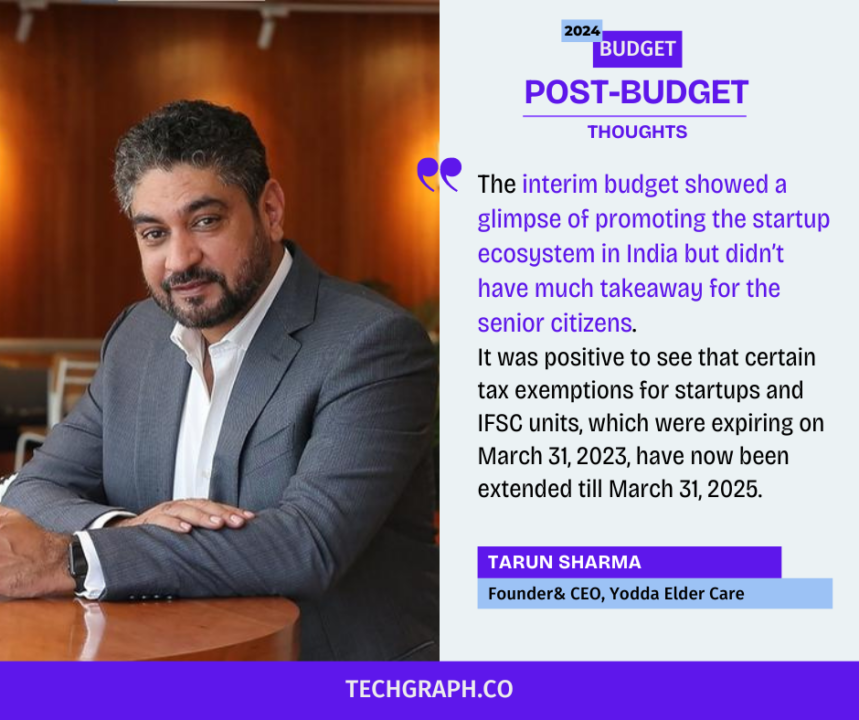
The interim budget showed a glimpse of promoting the startup ecosystem in India but didn’t have much takeaway for the senior citizens. It was positive to see that certain tax exemptions for startups and IFSC units, which were expiring on March 31, 2023, have now been extended till March 31, 2025.
There is an urgent need to address the growing challenges faced by senior citizens in India by making various elder care services more affordable and accessible.
With no change in income tax slabs and continued higher GST rates on various elder care services offered by private players, including at-home elder care services, there is an urgent need to address these challenges. We need robust economic policies that foster the growth of the elder care service sector in India and make such services affordable.
Akshat Saxena, Chief Executive Officer, Froker
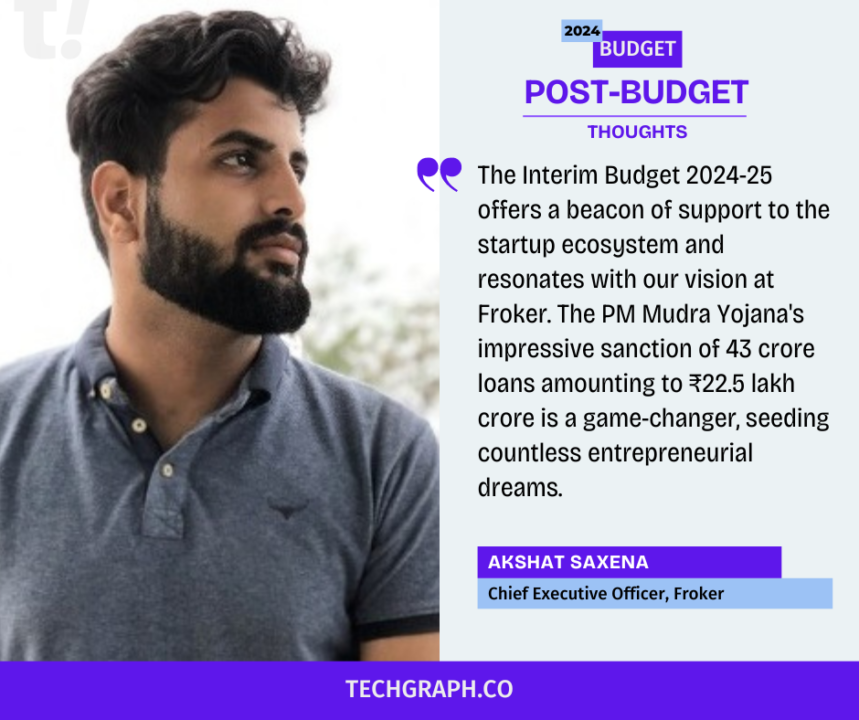
The Interim Budget 2024-25 offers a beacon of support to the startup ecosystem and resonates with our vision at Froker.
The PM Mudra Yojana’s impressive sanction of 43 crore loans amounting to ₹22.5 lakh crore is a game-changer, seeding countless entrepreneurial dreams. Tax benefits for startups, now extended to March 2025, and the incentivization of investments from wealth and pension funds will significantly lower the financial hurdles for emerging businesses.
Furthermore, the budget’s nod to ‘Annadata’ through MSP adjustments underlines the respect for our food providers, aligning with our mission for economic inclusivity. This financial blueprint is set to catalyze a new wave of innovation and resilience in the startup sector.
Kajal Malik, Co-founder and CBO at PickMyWork
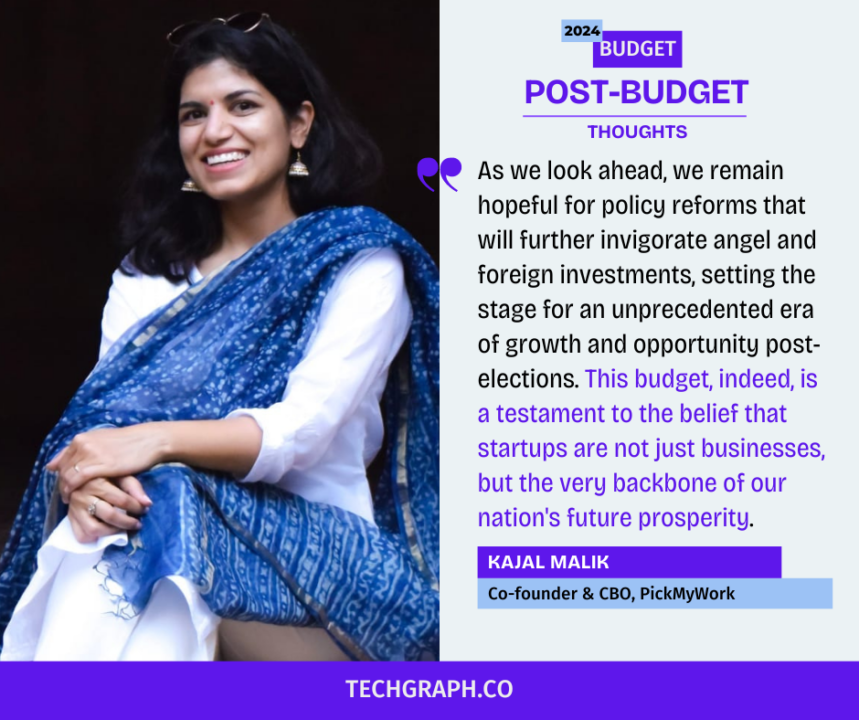
We understand this is an Interim Budget and did not introduce much on the policy aspect for startups specifically, nevertheless, with the allocation of an INR 1 lakh crore corpus for interest-free loans, the government not only acknowledges but firmly supports the pivotal role startups play in our economy’s fabric.
The extension of tax benefits for another year further cements the commitment to nurturing the immediate needs of this vibrant sector. As we look ahead, we remain hopeful for policy reforms that will further invigorate angel and foreign investments, setting the stage for an unprecedented era of growth and opportunity post-elections. This budget, indeed, is a testament to the belief that startups are not just businesses, but the very backbone of our nation’s future prosperity.
Manoj Purohit, Partner & Leader, Financial Services, Tax & Regulatory Services, BDO India
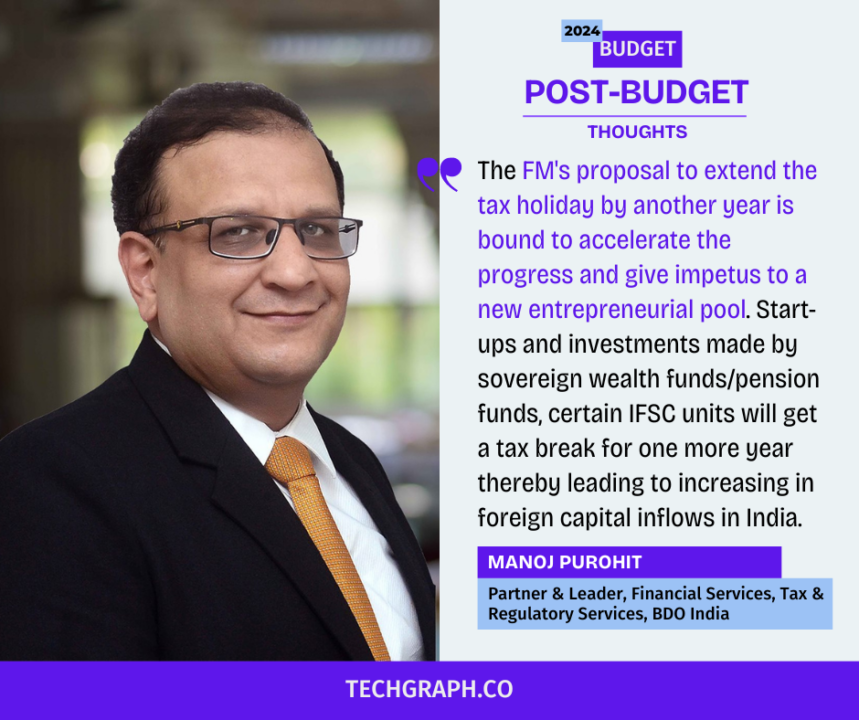
In recent years, the start-up ecosystem in India has expanded rapidly to emerge as a major driver of economic growth. The finance minister’s proposal to extend the tax holiday by another year is bound to accelerate the progress and give impetus to a new entrepreneurial pool. Start-ups and investments made by sovereign wealth funds/pension funds, certain IFSC units will get a tax break for one more year thereby leading to increasing in foreign capital inflows in India.
Mandar Natekar, Co-Founder & CEO, NeuralGarage
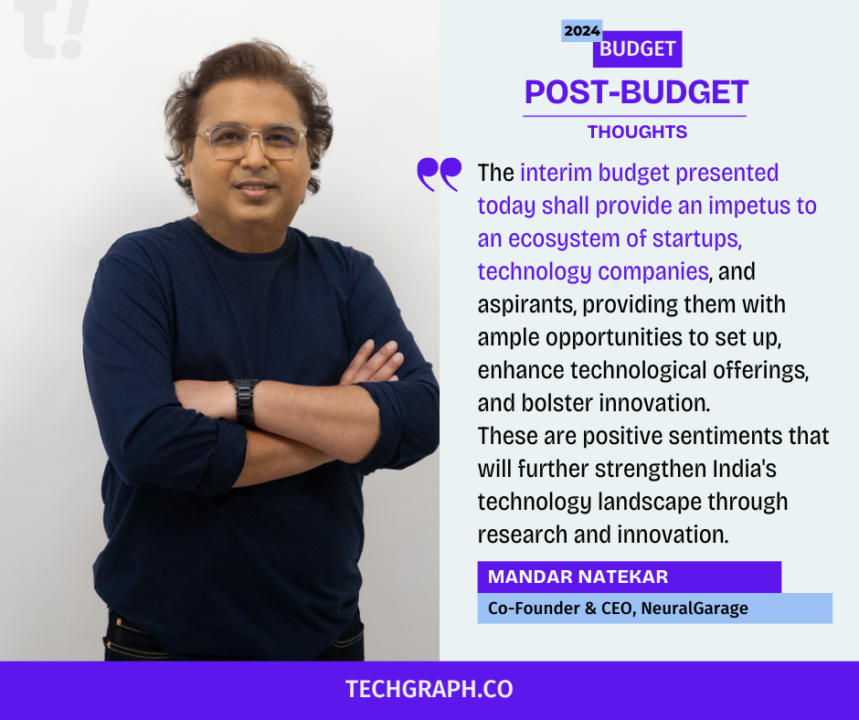
The interim budget presented today shall provide an impetus to an ecosystem of startups, technology companies, and aspirants, providing them with ample opportunities to set up, enhance technological offerings, and bolster innovation.These are positive sentiments that will further strengthen India’s technology landscape through research and innovation.
A corpus of Rupees One Lakh Crore will be established with a fifty-year interest-free loan. The corpus will provide long-term financing or refinancing with long tenors and low or nil interest rates. The private sector will witness a steep growth with innovation being at the forefront.
Further, the government has extended tax benefits for start-ups to March 31, 2025, and withdrawn some outstanding direct tax demands. Deeptech and GenAI have the potential to revolutionize a variety of sectors. Ethical practices and their usage will lead to Indian brands and artists being recognized from local to global markets creating a seamless experience and putting India on the global map for technological prowess.
Madhusudan Ekambaram, Co-founder and CEO of KreditBee
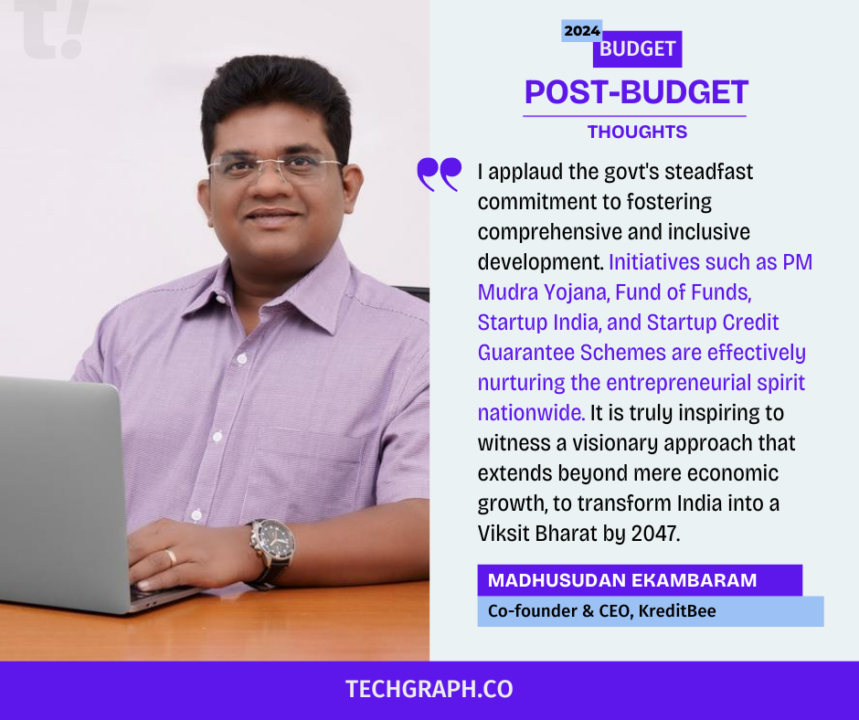
I applaud the government’s steadfast commitment to fostering comprehensive and inclusive development. Initiatives such as PM Mudra Yojana, Fund of Funds, Startup India, and Startup Credit Guarantee Schemes are effectively nurturing the entrepreneurial spirit nationwide. It is truly inspiring to witness a visionary approach that extends beyond mere economic growth, to transform India into a Viksit Bharat by 2047.
The proposed measures, including tax reductions, specialized support for developing industries, and augmented infrastructure spending in the forthcoming Budget 2024, are encouraging signs for the future, reflecting a collective endeavor towards sustainability, growth, and innovation within India’s dynamic startup ecosystem.
Sanjay Gupta, Chairman, IESA
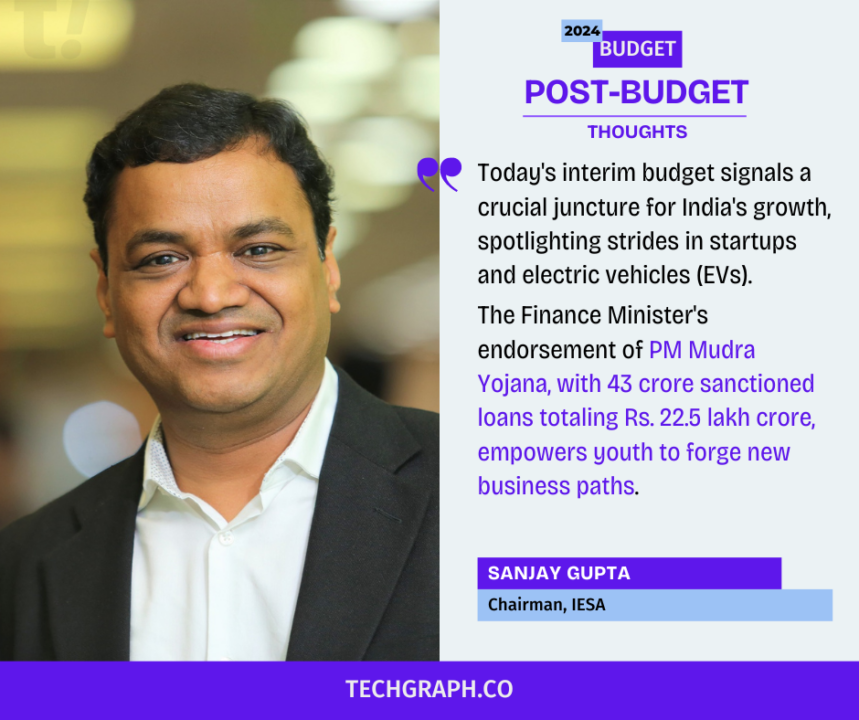
Today’s interim budget signals a crucial juncture for India’s growth, spotlighting strides in startups and electric vehicles (EVs). The Finance Minister’s endorsement of PM Mudra Yojana, with 43 crore sanctioned loans totaling Rs. 22.5 lakh crore, empowers youth to forge new business paths. The focus on the E-vehicle ecosystem, backed by robust support for manufacturing and charging infrastructure, aligns with global environmental goals, offering avenues for innovation and economic growth.
Emphasizing Fund of Funds, Startup India, and Startup Credit Guarantee Schemes underscores the government’s commitment to a vibrant startup culture. As stakeholders in electronics and semiconductors, we anticipate a surge in entrepreneurship, job creation, and a flourishing innovation ecosystem. The budget’s support for semiconductor usage in EVs aligns with global trends, positioning India at the forefront of the electric mobility revolution. We eagerly anticipate actively contributing to this transformative journey.
Sriram PH, Co-Founder & CEO at DaveAI
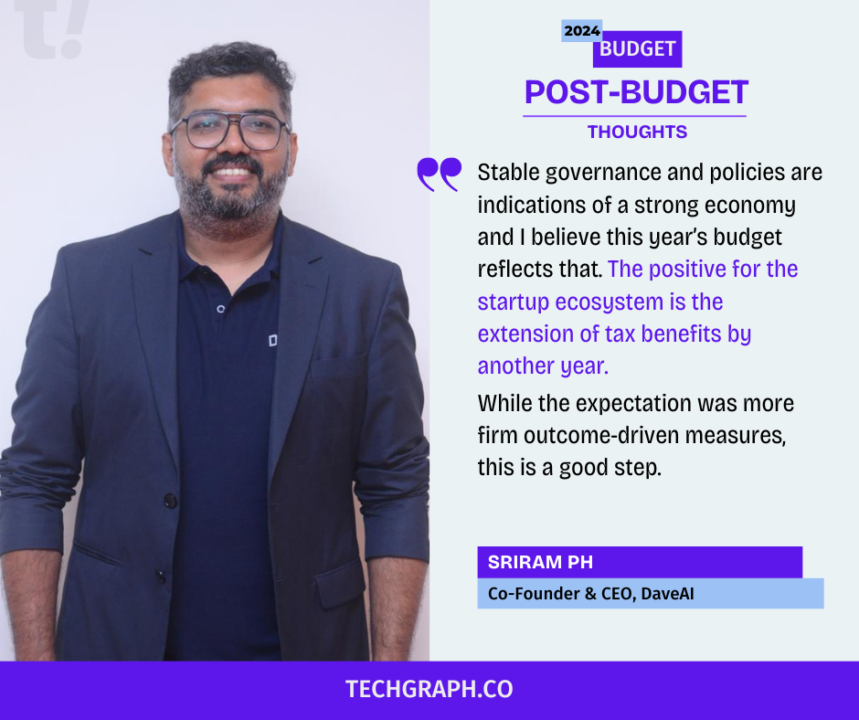
Stable governance and policies are indications of a strong economy and I believe this year’s budget reflects that. The positive for the startup ecosystem is the extension of tax benefits by another year. While the expectation was more firm outcome-driven measures, this is a good step. The emphasis on leveraging deep technology and interest-free funds for research & innovation will certainly help deep technology startups in the country.
Ankur Bansal, Blacksoil Capital
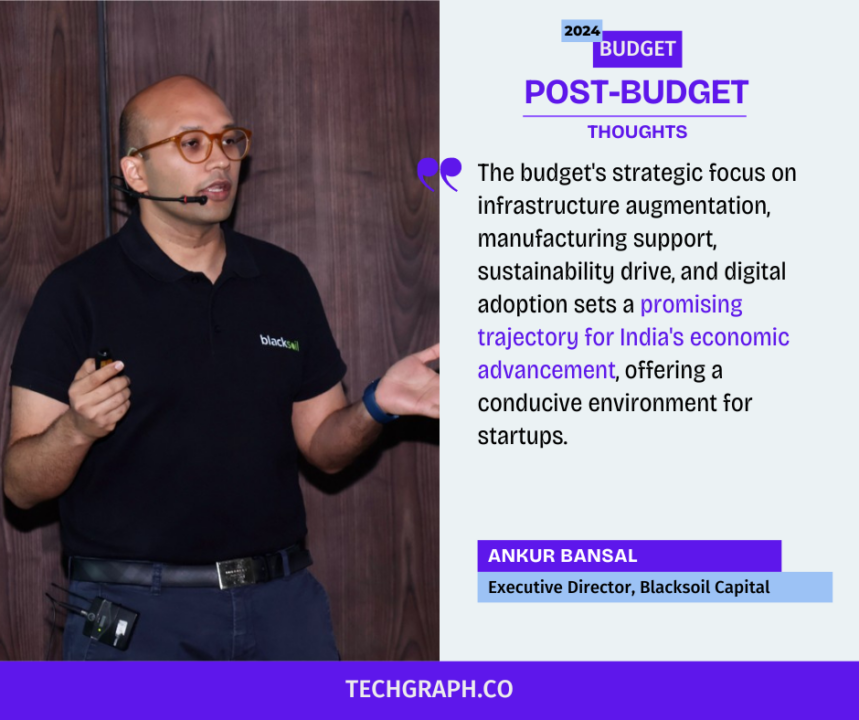
The budget’s strategic focus on infrastructure augmentation, manufacturing support, sustainability drive, and digital adoption sets a promising trajectory for India’s economic advancement, offering a conducive environment for startups. The proposed increase in capital expenditure target signals ample opportunities for growth and innovation, especially for the startup sector.
The proposal of establishing a Rs 1tn corpus with a 50-year interest-free (or low) loan for long-term financing for research and innovation in sunrise areas will encourage entrepreneurship and propel further growth in the startup industry. Empowerment through the proposed ₹30 Cr Mudra Yojana loans to women entrepreneurs is a long-awaited and welcome move. This will encourage greater female participation in the startup ecosystem and enhance gender equality in the workforce.
Furthermore, schemes to boost deep-tech innovations, incentives for green hydrogen and EVs, and investment promotion in post-harvest activities in the agri sector will nurture allied MSMEs and startups, creating job opportunities for the youth and fuelling the country’s economic growth.
Dr. Ananthakrishnan Gopal, Co-Founder & CTO, DaveAI
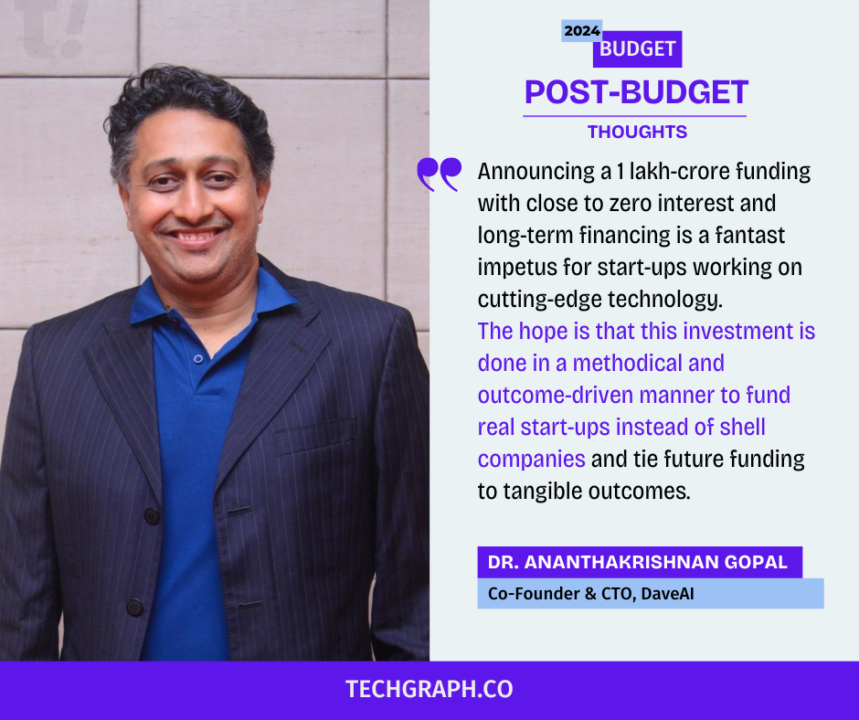
With investment funding drying up, the requirement for impetus from the government on R&D is very important. Announcing a 1 lakh-crore funding with close to zero interest and long-term financing is a fantast impetus for start-ups working on cutting-edge technology. The hope is that this investment is done in a methodical and outcome-driven manner to fund real start-ups instead of shell companies and tie future funding to tangible outcomes.



